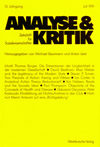ohne Titel

1982 (4) Issue 1
Editorial
Die Wissenschaftstheorie des 20. Jahrhunderts war über längere Zeit von der Vorstellung besessen, es gäbe nur eine dem Menschen eigene Vernunft, wie sie durch die modernen Naturwissenschaften, insbesondere die Physik, verkörpert wird. Für die Sozialwissenschaften hatte das die Konsequenzen, daß sie nur in dem Maße ernst genommen wurden, wie sie diesem Ideal nahekamen. Die Ökonomie war demzufolge die "exakteste" und "fortgeschrittenste" ihrer Disziplinen. Dabei scheint ihr zugute zu komme...
Table of Contents
Title: A Critique of the Discursive Systems and Foundation Concepts of Distribution Analysis
Author: Warren J. Samuels
Page: 4-21
Abstract: Productivity and exploitation theories of distribution are identified as alternative discursive systems. Both are shown to have analytic and interpretive strengths but also to be relative vis-a-vis the bases by which conclusions in terms of exploitation and productivity, respectively, are reached and stated. A third, nonideological (and therefore less emotionally satisfying) alternative mode of discourse is suggested: appropriation theory, focussing on power and inequality but without normative judgment. The work of Max Weber is used to illustrate appropriation theory.
Title: Economic Theory, Ideal Types, and Rationality
Author: Lansana Keita
Page: 22-38
Abstract: Contemporary economic theory is generally regarded as a scientific or at least potentially so. The replacing of the cardinal theory of utility measurement by the ordinal theory was supposed to prepare the groundwork for economics as a genuine science. But in adopting the ordinal approach, theorists saw fit to anchor ordinal theory to axioms of choice founded on principles of rational behavior. Behavior according to these axioms was embodied in the ideal type model of rational economic man. This model served the basis for scientific explanation of the choices made by actual economic agents. I argue though that the postulate of rationality is a normative principle and that this compromises the scientific pretensions of economic theory. Yet the theorist must rely on this principle to formulate predictive and explanatory theories. This raises questions as to whether it is possible that economic theory satisfy the same kind of scientific criteria set down for research in the natural sciences.
Title: Produktion, Markt und technischer Fortschritt
Author: Mario Cogoy
Page: 39-70
Abstract: The following article proposes a change of perspective in the capital-theory debate of political economy. Instead of insisting upon the differences between a Marxian labour theory of value and a Ricardo Sraffaian theory of prices of production (Marx versus Sraffa) the common basis of the two approaches is stressed. The common basis consists in the paradigm of duality between physical quantities and evaluation standards. The last part of the paper collects sceptical arguments concerning the question of whether the duality paradigm can provide an adequate approach to an analysis of modern technical change.
Title: Zu M. Taylors Analysen des Gefangenendilemmas
Author: Hartmut Kliemt / Bernd Schauenberg
Page: 71-97
Abstract: The theory of garnes, though at first greeted with great expectations by some social scientists, soon became a source of frustrated hopes to many of them. Too much of the theory seemed to be devoted to "zero-sum" and "one-shot" games. But most social contexts are not zero-sum and involve repeated interaction too. There was a certain lack of such game theoretic models which could be successfully adapted to social phenomena as were apt to appear in reality. Recently the theory of games seems to be on its way to closing this gap within a special branch devoted to "repeated games" or "supergames". Very promising is the approach of Michael Taylor which is surveyed and discussed in the subsequent paper. This approach has two main merits: First it can be understood with a modest mathematical background, secondly it can be adapted easily to a more precise reconstruction of classical topics in political theory. Though one might not agree with some of Taylor's conclusions it seems to be worthwhile to get acquainted at least with the basics of his analysis and to take it as a first step to opening avenues for future social research.
Title: Wisdom and Analytical Philosophy
Author: Jonathan Bennet
Page: 98-101
Abstract: Rorty's profound and challenging critique of contemporary philosophy is in several ways somewhat unfair. Analytic philosophy can contribute towards 'wisdom' in a reasonable sense of the term, though not in Rorty's narrow sense; and his contrast between 'sophist' and 'sage', with the latter understood in Plato's way, is also too constricting. Also, some contemporary 'analytic' work in the 'history of philosophy', so called, is not invalidated by Rorty's strictures - especially his implied accusation that we shan't be interested in the intellectual past if we can't look down on it.
Title: Philosophy and its History
Author: Alasdair MacIntyre
Page: 102-113
Abstract: Richard Rorty argues that the present state of analytic Philosophy is the result of the collapse of the logical empiricist program. But most of the characteristics of analytic philosophy which Rorty ascribes to that collapse predated logical empiricism. The historical explanation of the present state of philosophy must begin not later than with the schism between philosophy and the other disciplines in the seventeenth and eighteenth centuries. To begin then leads to a different view of how philosophical problems are generated.
Title: Philosophy's Self-Image
Author: Jay F. Rosenberg
Page: 114-128
Abstract: Rorty rejects the idea of a "permanent and neutral matrix of Heuristic concepts". The claim of privilege, however, is separable from the aim of universality, and this idea can be transposed into a regulative ideal, while still preserving the unique intellectual mission of a discipline of philosophy. Rorty's own positive picture of "edifying Philosophy" in contrast is arguably irresponsible and grounded in misreadings both of the epistemology of science and of episodes in the history of philosophy, especially the contributions of Kant.